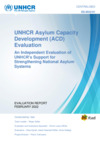-

ES/2022/01 UNHCR Asylum Capacity Development Evaluation
1 Jun 2022 This document summarises the findings, conclusions and recommendations of the Independent Evaluation of UNHCR's Support for Strengthening National Asylum Systems. The overall purpose of the evaluation is to review how UNHCR has fulfilled its objective to support and strengthen the capacity of national asylum systems in the period 2015–2020 and thereby improve the quality of protection for persons of concern and the sustainability of the systems that support this. Attachments: Executive Summaries (French, Spanish) and Annexes (.zip) -

ES/2022/02 Longitudinal evaluation of the Implementation of UNHCR's Age, Gender and Diversity policy Year 1 Report
24 May 2022 This report is part of a three-year formative evaluation commissioned by UNHCR's Evaluation Service to assess and support the implementation of the 2018 Age, Gender and Diversity (AGD) policy. -

Decentralized Workplan 22/23
13 Apr 2022 UNHCR's Evaluation Service Decentralized Workplan 2022/23 -

ES/2021/11 - UNHCR Country Strategy Evaluation: Zambia
11 Apr 2022 Zambia hosts the longest-standing refugee settlement in Africa, at Mayukwayukwa. It was established in 1966 and UNHCR has been actively engaged in the country since that time. As part of its 2020 workplan, UNHCR's Evaluation Service commissioned an independent evaluation team to conduct a Zambia country strategy evaluation for the period 2015 to 2020. The purpose of this forward-looking evaluation is to generate evidence to inform UNHCR's future operational planning and strategy in Zambia. The evaluation also aims to provide inputs into UNHCR Zambia's multi-year planning strategy beyond 2022. Attachments: Management Response and Annexes (.zip) -

COVID-19 Evaluative Evidence Brief #2
31 Jan 2022 To support organizational learning, UNHCR's Evaluation Service has commissioned an Evaluative Synthesis of UNHCR's adaptation and response to the COVID-19 pandemic. The purpose of the synthesis is to provide robust and timely evidence to UNHCR on how effectively the organisation has adapted to COVID-19 and to highlight areas of strength as well as the challenges emerging from across our evaluations. This is the second brief of the Evaluative Synthesis report. -

Evaluation of the caring for refugees with non-communicable diseases project
31 Dec 2021 This evaluation (full report) assesses the relevance, coherence, effectiveness, efficiency, impact and sustainability of a capacity-building project, entitled "Caring for Refugees with Non-communicable diseases Project". The project aimed to improve the quality of non-communicable diseases care for refugees in UNHCR's care. The findings of the evaluation will be used to support learning and accountability; to guide programme practices to improve non-communicable diseases care in refugee operations; and to document lessons learned from implementation and field practice. Attachments: Executive Summary and Management Response (.zip) -

Evaluation of UNHCR's Child Protection Programming 2017-2019
31 Dec 2021 This evaluation reviewed the United Nations High Commissioner for Refugees' child protection response in terms of its leadership role, strategies and programme performance with the purpose of informing the future of both UNHCR's child protection strategy and the implementation of UNHCR child protection programming. Attachments: Management Response Child Protection evaluation (.pdf) -

ES/2021/09 Evaluation of the Somos Panas Colombia Communication Campaign
31 Dec 2021 UNHCR in Colombia developed the Somos Panas ("We Are Buddies") Campaign to discourage expressions of xenophobia and promote empathy and solidarity towards Venezuelans to the benefit of society. This evaluation report evaluated the entire campaign and provides recommendations to improve actions during the next campaign cycle. Attachments: ES/2020/01 Executive Summary, Spanish version and Management Response (.zip) -

ES/2021/10 Evaluation of the project "Saving Maternal and Newborn Lives in Refugee Situations" in Cameroon, Chad and Niger.
31 Dec 2021 The United Nations High Commissioner for Refugees (UNHCR) commissioned this evaluation for the purpose of accountability and learning to inform future similar interventions. It examines the relevance, effectiveness and sustainability of the UNHCR and Bill and Melinda Gates Foundation (BMGF) project: "Saving maternal and newborn lives in refugee situations", implemented in three refugee operations in Chad, Niger and Cameroon between April 2018 and December 2019. Attachments: UNHCR Evaluation Management Response (.pdf)
